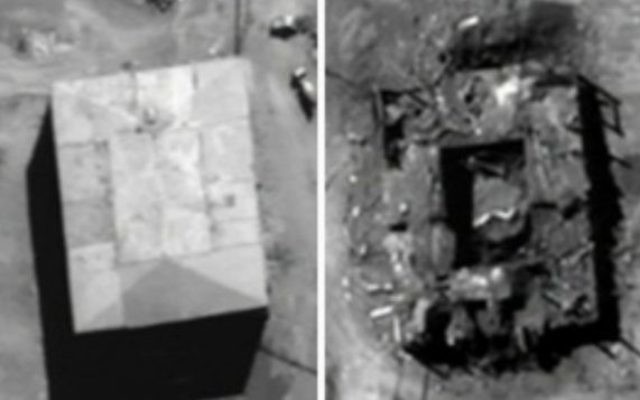Will Israel Attack Another Nuclear Facility?
The acknowledgment of the airstrike into Syria in 2007 reflects the Begin Doctrine.

Israel recently admitted to destroying a Syrian nuclear site in 2007. The facility, in the Deir al-Zour region, was built using North Korean assistance and technology.
Operation Outside the Box — a play on words related to the cubical shape of the facility — was the result of a scrupulous investigation and meticulous action. The region around the site later became an Islamic State stronghold.
It was not the first time Israel acted to prevent an Arab neighbor from acquiring a nuclear weapon. In June 1981 in Operation Babylon (also called Operation Opera), Israel destroyed an Iraqi nuclear reactor. That action set an Israeli foreign policy precedent known as the Begin Doctrine, after Menachem Begin, the prime minister of Israel from 1977 to 1983 and the man who ordered the attack.
Under the doctrine, Begin asserted that Israel would prevent any of her enemies from obtaining nuclear weapons that could be used against her. Similar to the 2007 operation in Syria, Israeli intelligence and military establishments knew about the Iraqi nuclear program well before 1981.
Under Prime Minister Yitzhak Rabin (1974-77), planning was underway to deal with the Iraqi threat. A series of military actions before Operation Babylon aimed to thwart Iraq’s development of a nuclear weapon.
By 1980, however, Israel had obtained photographic evidence, provided by American and pre-revolutionary Iranian intelligence agencies, of the site’s progress. In October 1980, the Mossad reported to Begin that the Iraqi facility could be operational as early as June 1981.
The Israeli government, while divided on whether to strike, voted to carry out the attack.
After months of rigorous training, 16 American-manufactured Israeli fighter jets took off from the Etzion air force base in the Israeli-controlled Sinai on June 7, 1981. The fighter pilots carried out a risky mission, destroying the Iraqi facility.
Despite numerous attempts after the strike, Saddam Hussein was never able to obtain a nuclear weapon.
The September 2007 operation against the Syrian reactor began with the Mossad documenting Syrian President Bashar al-Assad’s meeting with North Korean officials. Israeli intelligence engaged in phonetapping and computer hacking of Syrian officials.
Intelligence information was shared with the United States. Both the nuclear facility’s existence and its progress were irrefutably confirmed.
Israeli intelligence and operational plans culminated in an airstrike on the nuclear site Sept. 6, 2007. The plans had to include neutralizing the reactor without causing a radioactive, environmental disaster.
Aided by American communications technology, eight Israeli F-15s and F-16s entered Syrian airspace. The operation destroyed the facility. The mission succeeded in preventing the Assad regime from obtaining a nuclear weapon.
The operation had long-lasting geopolitical and military effects and raised important security questions:
- What if Islamic State had been able to access a Syrian-made nuclear weapon?
- What if one of the factions fighting in the Syrian civil war had access to a nuclear weapon?
- What if a nuclear device fell into the hands of the Iranian-trained and -funded fighters on Israel’s northern border?
- Would a Syrian nuclear weapon have spawned a regional nuclear arms race and emboldened North Korea to spread its technology to other hotspots?
Also relevant to this story are current international tensions with North Korea over its nuclear program. Israel’s official release about the September 2007 operation is not arbitrary. Detailing how Israel, aided by the United States and without detection, destroyed the Syrian facility is pertinent to the diplomatic stalemate with North Korea.
Today, with controversy swirling over the Iranian nuclear deal, the Begin Doctrine is often discussed in Israel.
The deal, struck by the United States, United Kingdom, France, Germany, Russia, China and Germany with Iran, is controversial in both Israel and the United States. President Donald Trump has a May deadline to scrap, renew or rework the deal. It remains to be seen whether the Begin Doctrine will again be enforced by the Israeli Air Force, this time with a focus on Iran.
Eli Sperling is the Israel specialist and assistant program coordinator for the Center for Israel Education.



comments